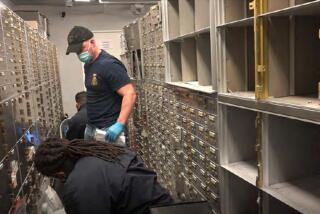Evidence in Espionage Case Ruled Inadmissible : Courts: Judge said computer tapes found in locker of man accused of computer-hacking crimes were illegally obtained.
Key evidence in an espionage case against a former North Hollywood man accused of several computer hacking crimes was illegally obtained, a federal judge ruled Monday.
U.S. District Judge Ronald Whyte in San Jose said computer tapes found in a storage locker rented by Kevin Lee Poulsen should not have been examined by prosecutors without a search warrant and cannot be used as evidence.
Whyte had ruled the tapes admissible last month but changed his mind, saying he had overlooked evidence that should have put a police officer on notice of Poulsen’s privacy rights.
In addition to illegal possession of classified government secrets, Poulsen faces 13 other charges, including eavesdropping on telephone conversations, and tapping into Pacific Bell’s computer and an unclassified military computer network. He could be sentenced to 85 years in prison if convicted of all charges.
His lawyer, Paul Meltzer of Santa Cruz, said the sole evidence of the espionage charge is contained on one of the storage locker tapes.
Meltzer said a government analyst found that the tape contained a 1987 order, classified secret, concerning a military exercise.
Meltzer said Poulsen maintains that he would not have knowingly possessed military secrets.
Poulsen also faces a trial in Los Angeles on charges that he used his computer skills to defraud a radio station during a Porsche automobile giveaway contest in 1990.
The lawyer said Poulsen, who has been in jail since 1991, has served enough time to be eligible for immediate release even if convicted of all the other charges in the San Jose case. His trial is scheduled to start Jan. 14. Assistant U.S. Atty. Robert Crowe could not be reached for comment.
Poulsen, who lived in Menlo Park at the time of his arrest in the San Jose case, worked in the mid-1980s as a consultant testing Pentagon computer security. He was arrested in 1988 on some of the hacking charges, disappeared and was picked up in April, 1991, after a tip prompted by a television show.
More to Read
Sign up for Essential California
The most important California stories and recommendations in your inbox every morning.
You may occasionally receive promotional content from the Los Angeles Times.










